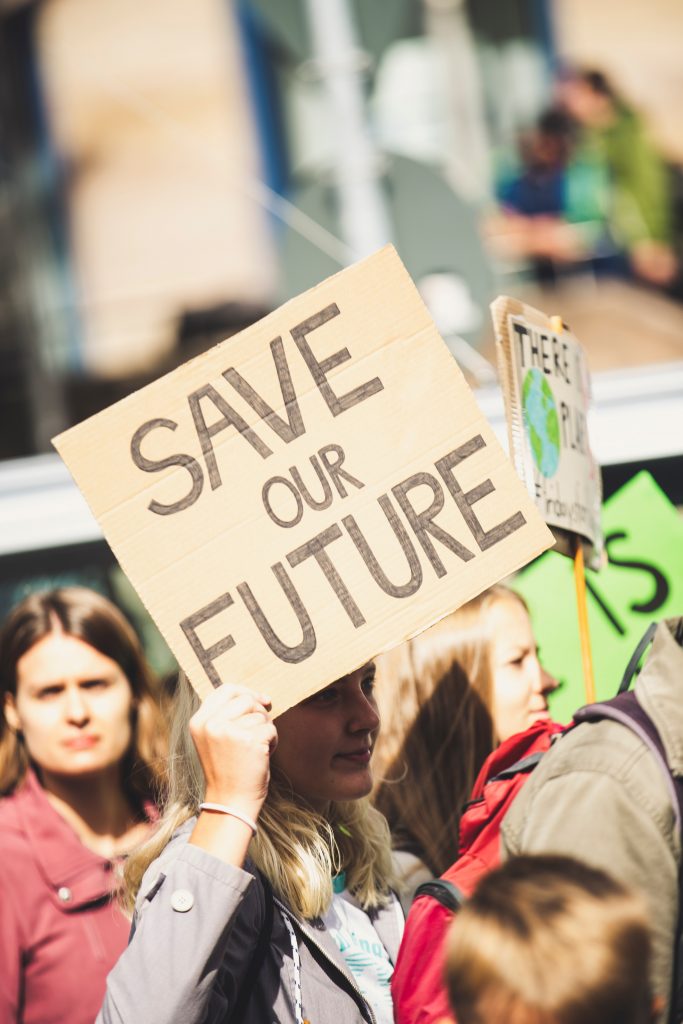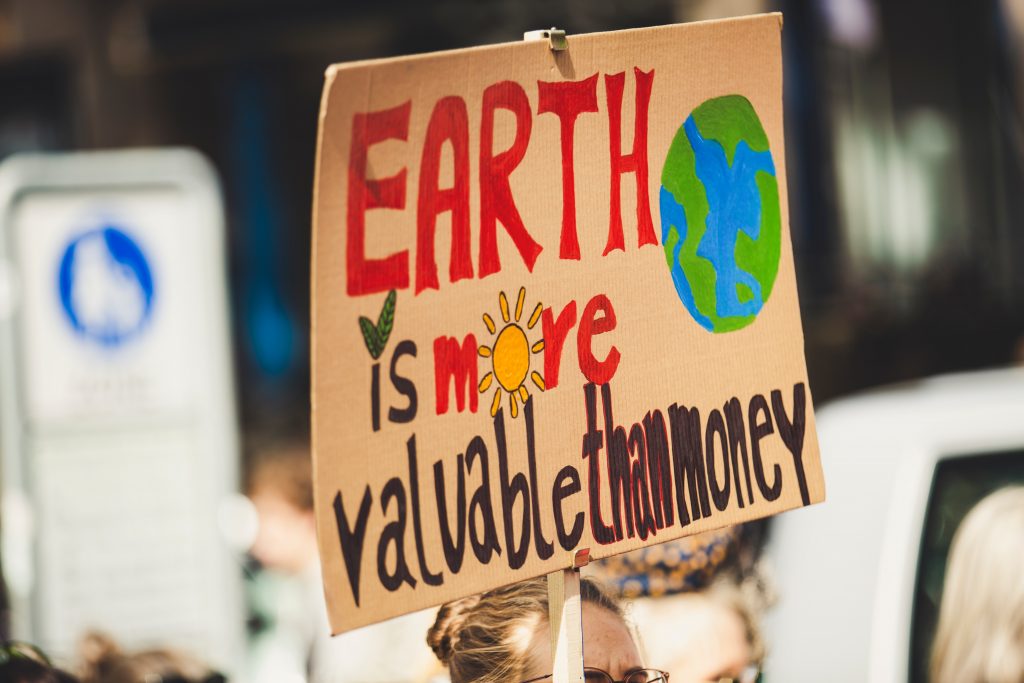Ann-Christin Grözinger, University of Siegen, Research assistant at the chair for Entrepreneurship and Family Business
Contact: Ann-Christin.Groezinger@uni-siegen.de
Abstract
I think a lot about the environment and what I can contribute to try preserving our natural ecosystem. That’s why I try to adapt to a more environmentally and sustainable lifestyle. I guess a lot of you do the same. We all try to make more conscious choices and search for sustainable alternatives. In this way we also support the people who stand behind those sustainable alternatives, the so-called sustainable entrepreneurs. Business owners that besides profit also pay attention to ethical and ecological aspects of their business. I guess you know at least one of those businesses in your local area. But did you ever wonder what drives those people to engage in such a business? I did, because a sustainable business like this includes more risks than “just” founding a “normal” business. That’s why in this blog entry I deal with the question of what drives these people to create such sustainable businesses, or to put it differently: What differs them from me and you? First of all, I look into what makes people act sustainably in the first place. The literature on this matter seems quite negatively biased. There are numerous drivers for sustainable behavior with very negative connotations (e.g. fear and guilt). I did not want to accept that, especially as sustainable behavior has been shown to increase people’s well-being. So I try to take on a positive psychological perspective and find possible positive aspects that drive sustainable entrepreneurs. Positive psychology is a stream of psychological research that deals with how people experience joy, show altruism and thus create healthy institutions and families. The good news is that I found some positive psychological resources, like hope, efficacy, resiliency, optimism and also the construct of mindfulness, which might have an impact on sustainable entrepreneurs. However, so far research has not dug into that matter but I think that there is a great potential in this research for the environment and maybe also politics, education and people in general.
It´s all about the little efforts. Is it?
Do you care about the environment? Let me guess, your answer is probably yes. Mine would be the same. So I sit here at my desk, with my recycled mason jar, from which I have laboriously scraped off the labels, and eat my breakfast. Obviously with plant-based milk, which is, of course, better for the environment. The other day I was in a shop that offers its products plastic-free for self-bottling. Equipped with more empty mason jars, I bought sustainable and plastic-free food and even a completely compostable sponge pumpkin called loofah, which I will use from now on to rinse the recycled jars. While I was shopping I was euphoric, proud of my commitment to our planet. On the way home, of course, climate-friendly by bus, my thoughts wandered: actually a great way to shop. Besides the fact that I had to carry a bit heavier than usual, and that the things were a little more expensive than in my regular supermarket, I didn’t take any further risks. For many, such consideration may seem strange. For me, growing up in southern Germany, such considerations are probably relatively normal. We like to save money, we like to be on the safe side and we don’t like risk too much.

So for me, shopping there is a safe bet. But what about the girl at the counter? I knew that she was part of the founding team of the shop because I supported the crowdfunding campaign. She was now practically an entrepreneur, to be precise a sustainable entrepreneur had her own business, had to pay for the rent of the shop space, deal with suppliers and so on. Quite a risk and a completely different level of commitment to our planet than I show. Not to mention all the work it takes to find suppliers and manufacturers who can deliver the goods plastic-free. To start a „normal“ company is probably easier. You don’t have to pay so much attention to the ethical and ecological aspects and just buy from the cheapest supplier. According to a study by the Borderstep Institute in cooperation with the University of Oldenburg, the long-term average value of business creations, which can be called “green start-ups” in Germany for the years 2006 to 2016, is 14.5 % on the total number of business creations. In this context, „green start-ups“ are defined as new companies whose technologies, products and services contribute to the ecological goals of the green economy. This number shows that sustainable entrepreneurs account for a significant share of German start-ups. (Trautwein, Fichter, & Bergset, 2018) So I asked myself: Why do some people take such a risk? What drives them to become a sustainable entrepreneur? And even more importantly: What makes these people different from me or even from „normal“ entrepreneurs? Actually, I always thought that I was very committed to the environment and I felt quite good about it. But that‘ s another level.
So in this blog entry, I want to focus on the drivers that make people become active as sustainable entrepreneurs. If you want to know a little bit more about the definition of sustainable entrepreneurship and what the triple bottom line is all about, I invite you to read Philipp’s blog entry. He gives a very interesting overview of these issues.
Why should we care about these questions?
Certainly, some of you are now wondering why it is so important to deal with the reasons that lead people to found a sustainable company. Well, for one thing, we already agree that the welfare of our planet somehow is of concern to us (remember my question from the beginning). On the other hand, there are other good reasons why it matters: New technologies or governance alone will not be able to stop climate change or other complex global sustainability issues; this also requires a cultural change towards sustainability (O’Brien & Hochachka, 2011). Studies show that environmental education programs can change the behavior of students to make it more sustainable. (Kerret, Orkibi, & Ronen, 2014, 2016) Reading this blog entry might have a similar effect ;). And even if not, these findings illustrate why knowing the drivers for sustainable entrepreneurship can be important for education and policy. In this way, programs can be designed that promote thinking and acting in the direction of sustainable enterprises.

But sustainable behavior can also be important for each of us: One reason is obvious, of course; climate change affects all of us, and in order to preserve our natural habitat as we know it in the future, we should all do something about our wasteful lifestyles. Moreover, climate protection makes us happier and I’m not joking about that. It has been proven that people who behave more sustainable experience more positive than negative emotions (Fredrickson, 2013) and can also improve their human well-being (Kerret et al., 2016). I also found a study that showed that people with a higher carbon footprint show a lower level of well-being than people with a smaller carbon footprint (Ambrey & Daniels, 2017) What a nice side-effect. As we try to „save“ the world from climate change, we automatically become a happier person.
Why do we act sustainable? – Or: It’s all about the pessimism.
Some would now say that if someone founds an environmentally friendly business this is simply related to the industry the entrepreneur wants to engage in. But Schick, Marxen, & Freimann (2002) showed that this does not hold true. Their research shows that start-ups within one industry differ widely in their engagement for the environment. They see this as an indication that one special factor is very influential when it comes to setting up companies in the environmentally friendly sphere: The entrepreneur himself/herself with his/her attitude.

As there is not a lot of research on the motivation of sustainable entrepreneurs yet, my first step to answer my questions was to look into the literature to find answers to why people act sustainably at all. Spoiler alert: I found some very demotivational insights.
For example, Kaida & Kaida (2016) show that there is a negative relationship between a pessimistic perspective of the future and pro-environmental behavior That means that people who believe their subjective well-being in the future is endangered are more likely to act in ways that help to preserve the environment, to prevent the undesirable outcomes in the future. Another study shows that the feeling of guilt and embarrassment contributes to people behaving in a more altruistic way (Kaiser, Schultz, Berenguer, Corral-Verdugo, & Tankha, 2008) and thus act more environmentally friendly. Furthermore, a little experiment showed that people at the public swimming pool, who get confronted by a “representative of the water conservation office”, tend to turn off the water while soaping and reduce their shower time in comparison to people who get not confronted. Thus as a result of the experiment, it can be concluded that a feeling of emotional discomfort and the awareness of hypocrisy drives people to act in a more environmental way (Dickerson, Thibodeau, Aronson, & Miller, 1992). With regard to entrepreneurs, it is also noticeable that they often start to introduce sustainable practices due to social pressure from their communities. (Koe, Omar, & Majid, 2014) These results show that research considers a lot of negatively connoted drivers for sustainable behavior.
“Don´t worry, be happy”- Or: why positivity also matters.
To be honest I did not want to believe that all the good intentions towards the environment draw from some kind of negative thing, like fear and guilt. I don’t consider myself a very fearful or guilty person. And furthermore, sustainable practices, in general, are regarded as positive behaviors (Corral Verdugo, 2012). I mean, I already showed that sustainable behavior has positive impacts on us. There must be “positive” drivers for sustainable behavior out there. So I dug deeper.

I found that the intention to behave sustainably is more likely if the persons‘ attitude towards this behavior is more positive, when the actions seem easy to achieve, when friends and family support you and when one sees the actions as appealing to their self-identity (Rex, Lobo, & Leckie, 2015). Furthermore, during my research, I came across an article by the author Corral Verdugo (2012) which is called: “The positive psychology of sustainability”. Jackpot. In his article, he also discusses the very negatively biased research on the psychology of sustainability. However, it must also be noted that psychological research, in general, has focused on the „negative side“ for a very long time. In 2002, the psychologist Seligman made „positive psychology“ more or less ready for mainstream application (Lopez & Snyder, 2011; Seligman & Csikszentmihalyi, 2000). Positive psychology focuses on the factors that explain the way people feel joy, show altruism, and thus create healthy families and institutions (Gable & Haidt, 2005). This positive stream also gained a foothold in economic literature in 2002 (Luthans, 2002a; Wright, 2003). However, it kind of makes sense that the negative side of psychology and thus also the psychology of sustainability was more pronounced. Humans (and also a lot of animals) pay more attention to negative events. Thus “bad is stronger than good” because of bad information signals that something needs to be changed (Baumeister, Bratslavsky, Finkenauer, & Vohs, 2001). Furthermore, it is apparent that one wants to help others who are feeling bad and who have mental health issues, before “helping” people who are doing well already. But nevertheless, it can also be argued that knowledge of human strengths and the mechanisms that contribute to well-being can help prevent such disorders (Gable & Haidt, 2005). Thus, positive approaches can be useful in sustainability research and also in entrepreneurship research. Due to the negative orientation, research not only loses the possibility to investigate the positive drivers of sustainable action but also the knowledge about the potential positive outcomes for people (like in the example above, that they have a higher well-being) besides those for the environment (Corral Verdugo, 2012).
The positive drivers for sustainable entrepreneurs
But as I said, I wanted to focus on the drivers for sustainable actions and here especially for entrepreneurs. In the already mentioned article of Corral Verdugo (2012), he summarizes the research on possible positive antecedent variables of sustainable behavior. For example, positive emotions like happiness (Brown & Kasser, 2005; van de Vliert & Janssen, 2002) or the emotional affinity (Kals, Schumacher, & Montada, 1999) toward nature can be linked to sustainable behavior. Furthermore, positive motives and attitudes like values determine conservationist behaviors (Stern, Dietz, Abel, Guagnano, & Kalof, 1999) and psychological (or personality) traits like responsibility (Guagnano, 1995) and external locus of control (Smith-Sebasto & Fortner, 1994) play their part in pro-environmental behavior. So it seems there is also a “bright” side of acting in a manner to preserve our planet. But now, let’s focus on the main question of this blog entry: How do sustainable entrepreneurs differ from you and me?

Since even climate change researchers have so far only scarcely examined the psychological aspect of environmental problems (Wamsler & Brink, 2018), not much can be found in the literature of entrepreneurship research either. But luckily at some point in my literature search, I found one paper, which deals with the question of what drives sustainable entrepreneurs. This article suggests that one of the motivations that drove the sustainable entrepreneurs was the aim to preserve the local and/or regional economy by giving something of value back to their surrounding. Another reason was that they actually aspire to change the world (Schlange, 2006). If considering the concept of optimism in this context, which is part of positive psychology, a relationship between the wish to change the world and optimism can be suspected:
Psychologist Martin Seligman laid the theoretical foundation of optimism (Seligman, 1998). Optimism refers to the coping of individuals with difficult circumstances. Optimistic individuals expect positive outcomes and therefore cope and face the difficulties in a constructive manner (Scheier, Carver, & Bridges, 2001). Thus optimism is “a positive explanatory style that attributes positive events to internal, permanent, and pervasive causes, and negative events to external, temporary, and situation-specific ones” (Luthans & Youssef, 2004, p. 153). In our case, we might suspect that environmental destruction, for example, is such a difficult circumstance or a negative event for the entrepreneurs. Due to their optimistic nature, they tend to see this as a temporary event, which can be changed to a permanent positive state. Thus they are not scared of a goal, which might seem unachievable for a not optimistic person, but rather see it constructively and think about how to change the initial situation.
Another result of the article by Schlange (2006) was that for most of the entrepreneurs studied one important part of their entrepreneurial vision was to create something innovative which was not existent yet. In their eyes, a sustainable company with a triple bottom line (see Philipps blog entry) offered a greater challenge than a company with only peruses financial goals. This suggests that sustainable entrepreneurs set themselves relatively ambitious goals. In this context, there is also a construct of positive psychology that explains such behavior: Self-efficacy (or short efficacy).
The psychological resource of self-efficacy is based on Bandura’s social cognitive theory (Bandura, 1997, 2012) and describes the ability of an individual to mobilize his/her motivation and cognitive abilities to successfully master future tasks (Bandura, 1982; Stajkovic & Luthans, 1998). Individuals with a high degree of efficacy believe in their abilities and set themselves more ambitious goals than those with a low degree of efficacy (Bandura, 2012). In fact, a study over 30 years ago already showed that perceived efficacy under high uncertainty leads to greater flexibility. (Bandura & Wood, 1989) Assuming that a sustainable company has a higher degree of uncertainty and risk compared to „normal“ companies (Schaper, 2016), the flexibility caused by the increased efficacy of the founders can lead to sustainable innovative products. In addition, a high level of efficacy leads to the fact that opportunities are more likely to be perceived than threats, thus increasing the probability that an individual will act in a risk-friendly manner. This has a direct influence on the evaluation of new environmental opportunities, and thus sustainable business opportunities. As the subjective process of evaluating environmental opportunities through perception is more likely to be positive due to a higher level of efficacy, the creation of a new environmental business is more likely. (Hostager, Neil, Decker, & Lorentz, 1998)
In addition to optimism and efficacy, other concepts of positive psychology can also be considered as drivers for sustainable entrepreneurship: Kerret et al. (2016), for example, define the concept of environmental hope, which is based on the concept of hope, that draws directly from the work of Snyder and consists of the two interacting components “(a) agency (goal-directed determination) and (b) pathways (planning of ways to meet goals)” (Snyder et al., 1991, p. 571). Agency refers to an individual’s sense of preserving and meeting goals, where pathways reflect the ability of an individual to imagine different ways to achieve the goal (Snyder et al., 1991). An individual with a high level of hope is showing different work-related goals (long- and short-term), is motivated to achieve these goals and can create different ways in which those goals can successfully be reached (Hmieleski, Carr, & Baron, 2015). In the context of environmental hope, these objectives and goals relate to the environment and sustainability (Kerret et al., 2016). ‘Constructive’ hope has already been found to have a positive effect on the sustainable behavior of young people. While ‘false’ hope which draws from denial of climate change shows a negative effect (Ojala, 2012). Similar results have bee found by Kerret et al. (2016), who show that environmental hope mediates the relationship between sustainable engagement and environmental behavior. These results show impressively that positive emotions, like (environmental) hope, can create a problem-oriented approach to e.g. climate change and thus increase commitment to climate-friendly behavior. (Ojala, 2012) In this context, however, no studies on sustainable entrepreneurs and (environmental) hope could be found. Nevertheless, I believe that there might be a link that is worth exploring. According to the results presented, people with a high level of hope show a higher level of sustainable behavior. For people who are interested in starting a sustainable business, this may lead to a higher level of sustainable behavior and thus influence the creation of a new sustainable business.
Something you have probably heard of, but maybe did not know was a positive psychology “thing”, is mindfulness. Rooted in Buddhist traditions it can be defined as “moment-to-moment awareness” and is “cultivated by purposefully paying attention to things we ordinarily never give a moment’s thought to” (Kabat-Zinn, 2005, p. 2).
Results suggest that trough mindfulness practices (e.g. formless meditation) natural social intelligence skills in individuals can be fostered which promotes a sustainable lifestyle (Carroll, 2016). Furthermore, there is evidence which points in the direction that mindfulness has a direct impact on sustainable behavior and the well-being of people who practice it (Ericson, Kjønstad, & Barstad, 2014) and also a higher motivation to engage in climate adoption (Wamsler & Brink, 2018). Thus mindfulness could also be a driver for sustainable entrepreneurs. Besides the direct impact on sustainable behavior, mindfulness has also been shown to increase the psychological adjustment after traumatic events and thus the resiliency of people (Thompson, Arnkoff, & Glass, 2011). Resiliency is another psychological resource that can be attributed to the positive psychology movement. The concept is at least as “popular” (if you can put it that way in research) as the other three mentioned psychological resources (hope, optimism, and efficacy). The concept of resiliency, which has its origin in clinical psychology (Masten, 2001; Masten & Reed, 2002), has become popular in organizational psychology (Luthans & Youssef-Morgan, 2017). Resiliency in the work area can be defined as: “[…] the positive psychological capacity to rebound, to ‘bounce back’ from adversity, uncertainty, conflict, failure or even positive change, progress and increased responsibility” (Luthans, 2002b, p. 702). Individuals high in resiliency are better able to accept adverse developments, and by solving the situation, they tend to increase their performance in comparison to the initial situation (Luthans, Vogelgesang, & Lester, 2006; Luthans & Youssef, 2004). Research on perceived powerlessness in regard to climate change shows that people who have a strong feeling of powerlessness are less likely to take action in this regard (Aitken, Chapman, & McClure, 2011; Haller & Hadler, 2008). Thus it can be concluded that people with a high level of resiliency, who according to the definition accept the adverse developments and who are thus more likely to take action, could also be more likely to engage in sustainable entrepreneurship.
But these are only speculations about possible relationships. So far, research has done very little to address the issue of drivers of sustainable entrepreneurship and especially the perspective of positive psychology. This means that I have identified a potential gap in research that might be worth investigating. But what can we draw from the information I have gathered here?
Resume

So let’s come back to the main question that I wanted to answer with this blog entry: What makes sustainable Entrepreneurs different from me, you and other “normal” entrepreneurs?
To be honest I cannot answer this question with certainty. I found that sustainable entrepreneurs seem to be driven to found a business as they want to give something of value back to their surroundings and that they want to change the world and thus possibly show a high level of optimism. They also seem to be very ambitious as a “simply” financially driven business is considered an easy task, which indicates a high level of self-efficacy. Furthermore, I found that sustainable entrepreneurs might show a higher level of mindfulness, which could have a direct influence on sustainable entrepreneurship. However, it might be more likely that mindfulness increases their resiliency and they are thus more motivated to take action and create a sustainable business.
What really differs them from me is not really clear to me right now. Maybe they have a higher level of those positive psychological resources (optimism, hope, efficacy, and resiliency), or maybe they are more „mindful“ as I am. I don´t know. One thing I can say for certain is, that research should start to really look into this matter. I guess that our planet and we can benefit from this knowledge. And maybe the answer for me is just as simple as this: Choi & Gray (2008) found that most sustainable entrepreneurs have very little to no business experience and thus did not know about the complex risks and the trade-off between principles and profit that a business brings. As I studied management maybe I just know too much and therefore I am too risk-averse. But maybe that’s just a very, very lazy excuse. Maybe one day I will also engage as a sustainable entrepreneur. If someone has an idea for such a business, just let me know.
References
Aitken, C., Chapman, R., & McClure, J. (2011). Climate change, powerlessness and the commons dilemma: Assessing New Zealanders’ preparedness to act. Global Environmental Change, 21(2), 752–760. https://doi.org/10.1016/j.gloenvcha.2011.01.002
Ambrey, C. L., & Daniels, P. (2017). Happiness and footprints: Assessing the relationship between individual well-being and carbon footprints. Environment, Development and Sustainability, 19(3), 895–920. https://doi.org/10.1007/s10668-016-9771-1
Bandura, A. (1982). Self-Efficacy Mechanism in Human Agency. American Psychologist, 37(2), 122–147. http://dx.doi.org/10.1037/0003-066X.37.2.122
Bandura, A. (1997). Self Efficacy: The Exercise of Control (1997th ed.). New York: Worth.
Bandura, A. (2012). On the Functional Properties of Perceived Self-Efficacy Revisited. Journal of Management, 38(1), 9–44. https://doi.org/10.1177/0149206311410606
Bandura, A., & Wood, R. (1989). Effect of Perceived Controllability and Performance Standards on Self-Regulation of Complex Decision Making. Journal of Personality and Social Psychology, 56(5), 805–814.
Baumeister, R. F., Bratslavsky, E., Finkenauer, C., & Vohs, K. D. (2001). Bad is Stronger than Good. Review of General Psychology, 5(4), 323–370. https://doi.org/10.1037/1089-2680.5.4.323
Brown, K. W., & Kasser, T. (2005). Are Psychological and Ecological Well-being Compatible? The Role of Values, Mindfulness, and Lifestyle. Social Indicators Research, 74(2), 349–368. https://doi.org/10.1007/s11205-004-8207-8
Carroll, M. (2016). Formless Meditation and Sustainability. In S. Dhiman & J. Marques (Eds.), Spirituality and Sustainability (pp. 139–153). https://doi.org/10.1007/978-3-319-34235-1
Choi, D. Y., & Gray, E. R. (2008). The venture development processes of “sustainable” entrepreneurs. Management Research News, 31(8), 558–569. https://doi.org/10.1108/01409170810892127
Corral Verdugo, V. (2012). The positive psychology of sustainability. Environment, Development and Sustainability, 14(5), 651–666. https://doi.org/10.1007/s10668-012-9346-8
Dickerson, C. A., Thibodeau, R., Aronson, E., & Miller, D. (1992). Using Cognitive Dissonance to Encourage Water Conservation1. Journal of Applied Social Psychology, 22(11), 841–854. https://doi.org/10.1111/j.1559-1816.1992.tb00928.x
Ericson, T., Kjønstad, B. G., & Barstad, A. (2014). Mindfulness and sustainability. Ecological Economics, 104, 73–79. https://doi.org/10.1016/j.ecolecon.2014.04.007
Fredrickson, B. L. (2013). Updated thinking on positivity ratios. American Psychologist, 68(9), 814–822. https://doi.org/10.1037/a0033584
Gable, S. L., & Haidt, J. (2005). What (and why) is positive psychology? Review of General Psychology, 9(2), 103–110. https://doi.org/10.1037/1089-2680.9.2.103
Guagnano, G. A. (1995). Locus of control, altruism and agentic disposition. Population and Environment, 17(1), 63–77. https://doi.org/10.1007/BF02208278
Haller, M., & Hadler, M. (2008). Dispositions to Act in Favor of the Environment: Fatalism and Readiness to Make Sacrifices in a Cross-National Perspective. Sociological Forum, 23(2), 281–311. https://doi.org/10.1111/j.1573-7861.2008.00059.x
Hmieleski, K. M., Carr, J. C., & Baron, R. A. (2015). Integrating Discovery and Creation Perspectives of Entrepreneurial Action: The Relative Roles of Founding CEO Human Capital, Social Capital, and Psychological Capital in Contexts of Risk Versus Uncertainty: Discovery and Creation Perspectives of Entrepreneurial Action. Strategic Entrepreneurship Journal, 9(4), 289–312. https://doi.org/10.1002/sej.1208
Hostager, T. J., Neil, T. C., Decker, R. L., & Lorentz, R. D. (1998). Seeing environmental opportunities: Effects of intrapreneurial ability, efficacy, motivation and desirability. Journal of Organizational Change Management, 11(1), 11–25. https://doi.org/10.1108/09534819810369536
Kabat-Zinn, J. (2005). Full catastrophe living: Using the wisdom of your body and mind to face stress, pain, and illness (15th ed.). New York: Delta Trade Paperbacks.
Kaida, N., & Kaida, K. (2016). Facilitating Pro-environmental Behavior: The Role of Pessimism and Anthropocentric Environmental Values. Social Indicators Research, 126(3), 1243–1260. https://doi.org/10.1007/s11205-015-0943-4
Kaiser, F. G., Schultz, P. W., Berenguer, J., Corral-Verdugo, V., & Tankha, G. (2008). Extending Planned Environmentalism: Anticipated Guilt and Embarrassment Across Cultures. European Psychologist, 13(4), 288–297. https://doi.org/10.1027/1016-9040.13.4.288
Kals, E., Schumacher, D., & Montada, L. (1999). Emotional Affinity toward Nature as a Motivational Basis to Protect Nature. Environment and Behavior, 31(2), 178–202. https://doi.org/10.1177/00139169921972056
Kerret, D., Orkibi, H., & Ronen, T. (2014). Green Perspective for a Hopeful Future: Explaining Green Schools’ Contribution to Environmental Subjective Well-Being. Review of General Psychology, 18(2), 82–88. https://doi.org/10.1037/gpr0000006
Kerret, D., Orkibi, H., & Ronen, T. (2016). Testing a model linking environmental hope and self-control with students’ positive emotions and environmental behavior. The Journal of Environmental Education, 47(4), 307–317. https://doi.org/10.1080/00958964.2016.1182886
Koe, W.-L., Omar, R., & Majid, I. A. (2014). Factors Associated with Propensity for Sustainable Entrepreneurship. Procedia – Social and Behavioral Sciences, 130, 65–74. https://doi.org/10.1016/j.sbspro.2014.04.009
Lopez, S. J., & Snyder, C. R. (2011). The Oxford Handbook of Positive Psychology (00002 ed.). Oxford: Oxford University Press, USA.
Luthans, F. (2002a). Positive organizational behavior: Developing and managing psychological strengths. Academy of Management Perspectives, 16(1), 57–72. https://doi.org/10.5465/ame.2002.6640181
Luthans, F. (2002b). The need for and meaning of positive organizational behavior. Journal of Organizational Behavior, 23(6), 695–706. https://doi.org/10.1002/job.165
Luthans, F., Vogelgesang, G. R., & Lester, P. B. (2006). Developing the Psychological Capital of Resiliency. Human Resource Development Review, 5(1), 25–44. https://doi.org/10.1177/1534484305285335
Luthans, F., & Youssef, C. M. (2004). Human, Social, and Now Positive Psychological Capital Management: Investing in People for Competitive Advantage. Organizational Dynamics, 33(2), 143–160. https://doi.org/10.1016/j.orgdyn.2004.01.003
Luthans, F., & Youssef-Morgan, C. M. (2017). Psychological Capital: An Evidence-Based Positive Approach. Annual Review of Organizational Psychology and Organizational Behavior, 4(1), 339–366. https://doi.org/10.1146/annurev-orgpsych-032516-113324
Masten, A. S. (2001). Resilience Processes in Development. American Psychologist, 56(3), 227–238. https://doi.org/10.1007/0-306-48572-9_2
Masten, A. S., & Reed, M.-G. J. (2002). Resilience in Development. In S. J. Lopez & C. R. Snyder (Eds.), Oxford Handbook of Positive Psychology. New York: Oxford University Press.
O’Brien, K., & Hochachka, G. (2011). Integral adaptation to climate change. Journal of Integral Theory and Practice, 5(1), 89–102.
Ojala, M. (2012). Hope and climate change: The importance of hope for environmental engagement among young people. Environmental Education Research, 18(5), 625–642. https://doi.org/10.1080/13504622.2011.637157
Rex, J., Lobo, A., & Leckie, C. (2015). Evaluating the Drivers of Sustainable Behavioral Intentions: An Application and Extension of the Theory of Planned Behavior. Journal of Nonprofit & Public Sector Marketing, 27(3), 263–284. https://doi.org/10.1080/10495142.2015.1053342
Schaper, M. (2016). Understanding the Green entrepreneur. In M. Schaper (Ed.), Making Ecopreneurs: Developing Sustainable Entrepreneurship (2nd ed., pp. 7–21). https://doi.org/10.4324/9781315593302
Scheier, M. F., Carver, C. S., & Bridges, M. W. (2001). Optimism, pessimism, and psychological well-being. In E. C. Chang (Ed.), Optimism & pessimism: Implications for theory, research, and practice. (pp. 189–216). https://doi.org/10.1037/10385-009
Schick, H., Marxen, S., & Freimann, J. (2002). Sustainability Issues for Start-up Entrepreneurs. Greener Management International, 2002(38), 56–70. https://doi.org/10.9774/GLEAF.3062.2002.su.00007
Schlange, L., E. (2006). What drives sustainable entrepreneurs? Applied business and entrepreneurship association international.
Seligman, M. E. P. (1998). Learned Optimism (2nd ed.). New York: Pocket Books.
Seligman, M. E. P., & Csikszentmihalyi, M. (2000). Positive psychology: An introduction. American Psychologist, 55(1), 5–14. https://doi.org/10.1037//0003-066X.55.1.5
Smith-Sebasto, N. J., & Fortner, R. W. (1994). The Environmental Action Internal Control Index. The Journal of Environmental Education, 25(4), 23–29. https://doi.org/10.1080/00958964.1994.9941961
Snyder, C. R., Harris, C., Anderson, J. R., Holleran, S. A., Irving, L. M., & Sigmon, S. X. (1991). The Will and the Ways: Development and Validation of an Individual-Differences Measure of Hope. Journal of Personality and Social Psychology, 60(4), 570–585.
Stajkovic, A. D., & Luthans, F. (1998). Self-efficacy and work-related performance: A meta-analysis. Psychological Bulletin, 124(2), 240–261. https://doi.org/10.1037/0033-2909.124.2.240
Stern, P. C., Dietz, T., Abel, T., Guagnano, G. A., & Kalof, L. (1999). A Value-Belief-Norm Theory of Support for Social Movements: The Case of Environmentalism. Human Ecology Review, 6(2), 17.
Thompson, R. W., Arnkoff, D. B., & Glass, C. R. (2011). Conceptualizing Mindfulness and Acceptance as Components of Psychological Resilience to Trauma. Trauma, Violence, & Abuse, 12(4), 220–235. https://doi.org/10.1177/1524838011416375
Trautwein, C., Fichter, K., & Bergset, L. (2018). Green Economy Gründungsmonitor 2017. Berlin, Oldenburg: Borderstep Institut, Universität Oldenburg.
van de Vliert, E., & Janssen, O. (2002). “Better than” Performance Motives as Roots of Satisfaction Across more and Less Developed Countries. Journal of Cross-Cultural Psychology, 33(4), 380–397. https://doi.org/10.1177/00222102033004002
Wamsler, C., & Brink, E. (2018). Mindsets for Sustainability: Exploring the Link Between Mindfulness and Sustainable Climate Adaptation. Ecological Economics, 151, 55–61. https://doi.org/10.1016/j.ecolecon.2018.04.029
Wright, T. A. (2003). Positive organizational behavior: An idea whose time has truly come. Journal of Organizational Behavior, 24(4), 437–442. https://doi.org/10.1002/job.197
